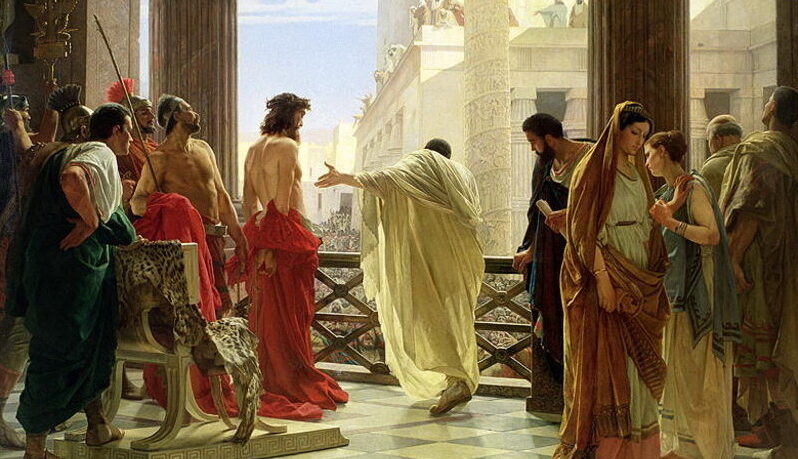

by Antonio Ciseri 1871
Part One, Part Two, Part Three, Part Four, Part Five.
For the entire article go here: Challenging Religion.
The Righteousness of the Pharisees
At the start of his ministry Jesus announced that his message would bring about a different kind of righteousness, which he contrasted with that of Pharisees: ‘For I tell you, unless your righteousness exceeds that of the scribes and Pharisees, you will never enter the kingdom of heaven.'(45) The Pharisees were hypocritical, petty and legalistic in their devotion but what lacked above all was sincerity. Shortly before his death, Jesus, in fulfillment of the prophetic tradition denounced the Pharisees and the teachers of the law:
“Woe to you, scribes and Pharisees, hypocrites! For you tithe mint and dill and cumin, and have neglected the weightier matters of the law: justice and mercy and faithfulness. These you ought to have done, without neglecting the others. You blind guides, straining out a gnat and swallowing a camel!
“Woe to you, scribes and Pharisees, hypocrites! For you clean the outside of the cup and the plate, but inside they are full of greed and self-indulgence. You blind Pharisee! First clean the inside of the cup and the plate, that the outside also may be clean.
“Woe to you, scribes and Pharisees, hypocrites! For you are like whitewashed tombs, which outwardly appear beautiful, but within are full of dead people’s bones and all uncleanness. So you also outwardly appear righteous to others, but within you are full of hypocrisy and lawlessness.(46)
The Greek word for ‘hypocrite’, hupokrités ὑποκριτής, is the same one that is used for ‘actor’. Actors in the Greek Theatre would wear masks. In this sense what religionists project is really just what the Romans called a ‘persona’, from the Latin per sonare, literally ‘speak through’, which was the mask that actors in ancient Rome used to wear at the theatre. The result of all this is always excuses, justifications and the twisting of the truth. When confronting the Pharisees, Jesus spoke of the dichotomy between their professed beliefs and what was really in their hearts: ‘You are those who justify yourselves before men, but God knows your hearts.'(47) Theirs was an outer husk that didn’t correspond to their inner identity. Not for nothing Jesus warned, ‘Beware of the leaven of the Pharisees, which is hypocrisy. Nothing is covered up that will not be revealed, or hidden that will not be known.'(48)
In this sense religion reflects the greater battle between the two main worldviews talked of in the Bible, represented symbolically by Zion on one side and the GraecoRoman mindset on the other. We are told: ‘I will rouse your sons, Zion, against your sons, Greece.'(49) Whereas, according to Jesus, Nathaniel was a true Israelite because of his authenticity, ‘Behold, an Israelite indeed, in whom there is no deceit!'(50), GraecoRoman civilisation, and the Babylonian system it stands for, seeks the theatricalisation of reality. Its three genres being tragedy, comedy and satyr. Much like Pirandello’s masks,(51) we see the reduction of life to a show, a gigantic spectacle, in which the division between the inner-self and the outer shell that is projected externally are in radical contrast.
At the same time religion creates a warped sense of reality. It’s amazing how endless amounts of time are dedicated to minor topics in certain churches while important issues, what Jesus called ‘weightier’ matters, remain totally off the radar. In fact, one of the key characteristics of the Pharisees, that Jesus repeatedly underlines in his final denunciation of them, is their total blindness.(52) And we see this in present day religion which seems for the most part totally indifferent to the plight of billions of God’s creatures.
Weighed and found Wanting
When confronting the Sadducees, the other main religious group of the time, Jesus underlined the source of their error: ‘You err, not knowing the Scriptures, nor the power of God.'(53) Religion doesn’t really understand Scripture, which as we have seen, is used as a pretext to reinforce preexisting agendas and is quoted at best haphazardly. But religion also doesn’t know the power of God, that is the power of the resurrection, which is the power of salvation for everyone who believes.(54) The Apostle Paul in this sense talked of the false religion of the last days as being devoid of genuine goodness and “having a form of godliness but denying its power.'(55)
And one of the reasons religion will ultimately be weighed and found wanting is for its treatment of animals. This is an age of sowing, often in tears and sorrow, in which Jesus has to go through his passion for humanity and also for all of creation.(56) In this sense Jesus is bearing the suffering of even the smallest of his creatures. But Christ and the crucifixion are also a judgement against religion and every power structure that seeks its own sacralisation. For this reason the message of the cross and the resurrection are the greatest challenge to, and ultimately the condemnation of, the religious pretensions of man.
____________________
(45) Matthew 5:20.
(46) Matthew 23:23-28.
(47) Luke 15:16.
(48) Luke 12:1-2.
(49) Zechariah 9:13.
(50) John 1:47. 51 L. Pirandello, Uno, Nessuno, Centomila , 1926.
(52) See in particular Matthew 23:16-19, but also Matthew 15:14.
(53) Matthew 22:29. 54 Romans 1:16. 55 2 Timothy 3:5. 56 Acts 9:4, Colossians 1:24.
Thank you for reading and following our blog! Please share with others, and any comments or questions are welcome. Blessings ~ Marcello

